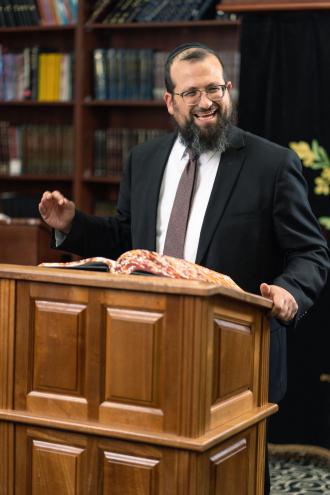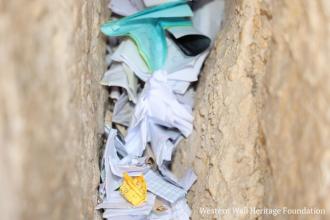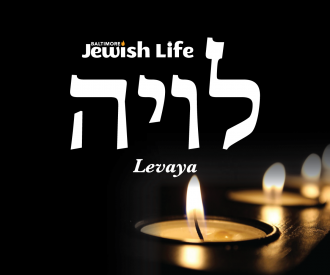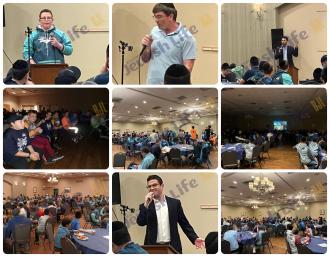“G-d spoke to Moshe and Aharon, saying: If a man has on the skin of his body: A white blotch or a bright spot …. The Priest shall pronounce him ritually impure, for this discoloration is Tzaraas.” (Vayikra 13:1-6)
It was a gift. Not the type of gift that makes you feel loved and appreciated; but the kind of gift that opens your eyes and heart to the realities of life. The gift to which I refer was the gift of Tzaraas (loosely translated as leprosy). Tzaraas was a physical manifestation of a spiritual malady. The Talmud explains that if one spoke Lashon Hara (slander against another), they would be stricken with a strange skin disease. One would have to appear before the kohen (priest) to have the discoloration or blotch examined. If the spot met certain criteria, the kohen would declare the individual tamei (impure). The afflicted individual would then be exiled and sent out from the community. His punishment was middah k’neged middah, reciprocal in nature; he sought to isolate another through negative and slanderous speech and therefore, we punish him in kind by isolating him from the community. Yet, despite the difficulties this punishment brought upon the sinner – it was a gift. It was through this sickness that the sinner was made aware of his negative and deleterious behavior. It was through Tzaraas that the slanderer was given an opportunity to fix himself and right his wrongs. During the days of isolation, the sinner was able to reflect on his behavior and begin to take the necessary substantive, rehabilitative steps.
The Torah then proceeds to discuss the purification process. “This shall be the law of the person afflicted with tzara’ath, on the day of his cleansing: He shall be brought to the kohen (Vayikra 14:2).” Yet, the very next verse reads, “The kohen shall go outside the camp, and the kohen shall look, and behold, the lesion of tzara’ath has healed in the afflicted person (Vayikra 14:3).” At first glance it appears the verses are contradicting one another. Is the Metzorah (person afflicted with Tzaraas) brought to the Kohen? Or is the Kohen brought to the Metzorah?
The answer is – both. As a result of his behavior, the Metzorah was rejected by the community. The verse states, “All the days the lesion is upon him, he shall remain unclean. He is unclean; he shall dwell isolated; his dwelling shall be outside the camp (Vayikra 13:46).” The Talmud explains that even others who were themselves ritually impure had to avoid contact with the Metzorah. He was away from his family, distanced from his community, and cut-off from his people. All this to impress upon him the severity of his actions. “You created a distance between one man and his fellow; therefore, you must sit alone outside the camp (Arachin 16b).” The Metzorah was taught a harsh, yet profound lesson – there is no room within the camp and community for those who sow the seeds of hatred and animosity within our ranks. But along with this lesson came a fear – a fear that this feeling of rejection would forever isolate the Metzorah and make him think that he would never reintegrate. In fact, the Midrash comments, “And he shall be brought to the Kohen; on the day that he becomes pure he should not delay … even if we must bring him against his will.” Could we imagine a scenario in which the Metzorah was reticent to return for his purification process? Would he not want to be reunited with his family? Would he not yearn to resume his normal life? Yet, the Torah tells us that this concern does exist. He may not want to come back – why? Because the Metzorah may say, “Look what I have done to myself. Look how I have sullied my soul and reputation. I have hurt others, and how will they ever forgive me? I have fractured relationships, caused heartbreak. I don’t think I can ever go back.”
The Torah tells us, on the day he is to be purified, he should come to the Kohen on his own. He has paid the price for his negative behavior; he has repented, learned his lesson, and will hopefully be more vigilant in his inter-personal conduct. But G-d tells the Kohen, “If you see he is not showing up – go get him. Run to him, embrace him, bring him back, tell him that we, the community, love, care and forgive him. Make him feel wanted. Remind him that we do get second chances.”
There are times when people wrong us and hurt us. Often, because of the emotional pain endured, I want nothing to do with the person who hurt me. Truth be told, after a difficult or hurtful interaction, a little distance (sometimes for a long time) is what is needed to heal the wounds and rebuild the self. But we must learn from the Metzorah the need to give second (third, fourth…) chances. I must remember that if the person who harmed me is truly penitent, understands what he has done, and has demonstrated a desire to do things differently going forward – I must leave my heart and the door open to reconciliation. People aren’t perfect, and I must allow those around me to find their interpersonal redemption in the aftermath of relationship failure. But there is another lesson as well. We must learn to forgive ourselves. We all make mistakes. There are some who carry the pain of their mistakes with them every moment of every day. There are people who cannot let go of the pain of personal failure. The laws of Tzaraas teach us that we must forgive the other; but we must also learn to forgive ourselves.















